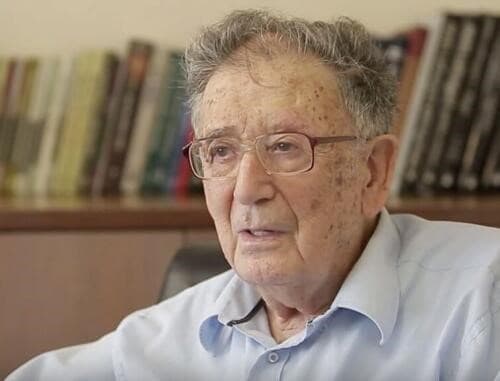With a heavy heart, MEMRI mourns the passing, on October 18, 2024 at the age of 98, of Professor Yehuda Bauer, Professor Emeritus of History and Holocaust Studies at the Avraham Harman Institute of Contemporary Jewry at the Hebrew University of Jerusalem, Academic Advisor to Yad Vashem, the World Holocaust Remembrance Center, and a member of the MEMRI Board of Advisors.

Prof. Bauer (Source: Times of Israel)
Born in Prague, Czechoslovakia in 1926, and fluent in eight languages, including English, French, German, and Hebrew, Prof. Bauer, a Holocaust survivor, was the preeminent historian of the Holocaust and a leader in Holocaust education and research.
About Prof. Bauer, MEMRI founder and president Yigal Carmon said: "Yehuda was a true classical liberal, and, with his profound understanding of antisemitism, was a leader in the International Holocaust Remembrance Alliance (IHRA). It was he who was behind its formulation and adoption of the Working Definition of Antisemitism. In one of my last conversations with him, I told him about attempts by extremist elements, in the IHRA and outside it, including in Israel, to change the definition with the aim of condemning Israel. He said to me: 'I know of these attempts, and as far as these elements are concerned, I am a right-winger! But neither these new fashions, nor anything else, can move me from my belief in this definition.'"
IHRA Working Definition of Antisemitism, adopted in 2016, states: "Antisemitism is a certain perception of Jews, which may be expressed as hatred toward Jews. Rhetorical and physical manifestations of antisemitism are directed toward Jewish or non-Jewish individuals and/or their property, toward Jewish community institutions and religious facilities." As of the end of 2022, it had been adopted by 1,116 global entities, including nations, cities, universities, NGOs, and corporations, and it serves as a widely recognized tool in the effort to identify all forms of anti-Jewish hatred.
As a member of our Board of Advisors, Prof. Bauer advised MEMRI in research on Arab antisemitism, and participated in panel discussions and events at MEMRI in Jerusalem. He said of MEMRI in 2010: "Without MEMRI, I would not be able to do my work. My speech at the UN General Assembly on January 27, 2006, as well as my lectures to many European and American audiences, would have been impossible without the material that MEMRI provides... The West needs an absolutely truthful, reliable translation service of the highest degree that will provide the necessary information to policy makers, to experts, and to intellectuals who can analyze the material and make useful suggestions on policies."
He will be greatly missed by all of MEMRI.




.jpg)